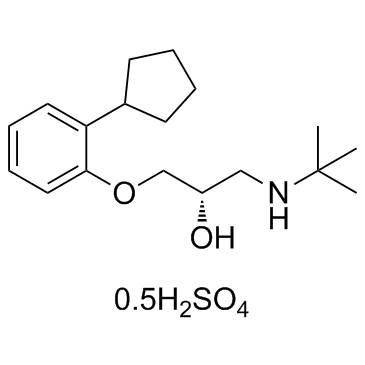Decrease in penbutolol protein binding as a consequence of treatment with some alkylating agents.
C Aguirre, J M Rodríguez-Sasiain, R Calvo
Index: Cancer Chemother. Pharmacol. 34(1) , 86-8, (1994)
Full Text: HTML
Abstract
The effect of in vitro treatment of serum with the alkylating agents carmustine (BCNU) and mechlorethamine on the protein binding of penbutolol, a basic agent mainly bound to alpha 1-acid glycoprotein (AAG), was investigated. The free fraction of penbutolol increased significantly (P < 0.001) after the treatment of serum with BCNU (5.27+ +/- 0.47%) and with mechlorethamine (5.23% +/- 0.17%), being 1.98% +/- 0.18% in serum not treated with BCNU or mechlorethamine. In addition, after incubation with BCNU (2 h), the free fraction of penbutolol continued increasing (10.96% +/- 0.70% vs 5.27% +/- 0.47% at time 0; P < 0.001), whereas it remained unchanged after incubation with mechlorethamine. Moreover, dialysis against saline for 24 h did not restore the free fraction of penbutolol, which increased after treatment with carmustine (9.05% +/- 1.24% vs. 11.04% +/- 1.55%, nondialyzed). We concluded that the treatment of cancer patients with alkylating agents could alter the serum proteins and modify their binding capacity, and this should be taken into account in the simultaneous treatment of these patients with other basic drugs like penbutolol, e.g., methadone.
Related Compounds
| Structure | Name/CAS No. | Molecular Formula | Articles |
|---|---|---|---|
 |
Penbutolol sulfate
CAS:38363-32-5 |
C18H29NO2.1/2H2O4S |
|
5-HT receptor subtypes involved in the spinal antinociceptiv...
2001-11-30 [Eur. J. Pharmacol. 432(1) , 1-7, (2001)] |
|
Autoreceptors remain functional after prolonged treatment wi...
1999-07-24 [Brain Res. 835(2) , 224-8, (1999)] |
|
Affinity of (+/-)-pindolol, (-)-penbutolol, and (-)-tertatol...
2000-08-01 [J. Neurochem. 75(2) , 755-62, (2000)] |
|
The antiaggressive potency of (-)-penbutolol involves both 5...
1996-02-15 [Eur. J. Pharmacol. 297(1-2) , 1-8, (1996)] |
|
High-performance liquid chromatography with chemiluminescenc...
2001-06-15 [J. Chromatogr. B. Biomed. Sci. Appl. 757(2) , 229-35, (2001)] |